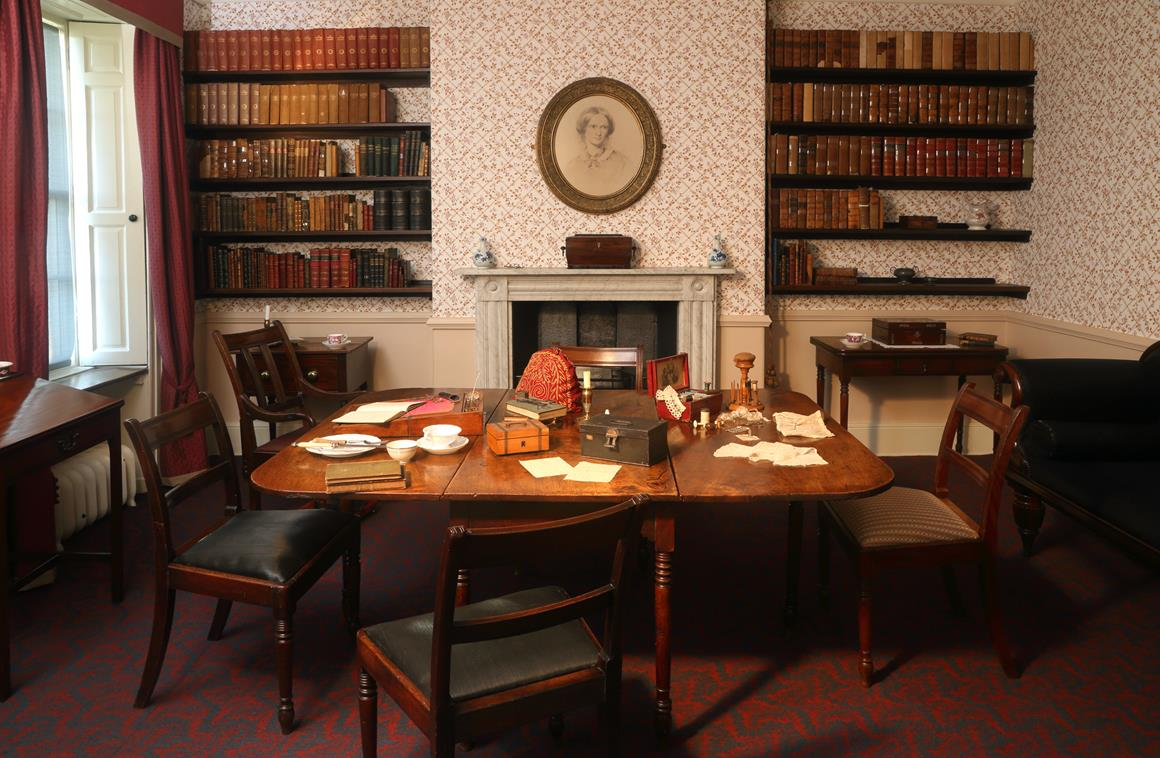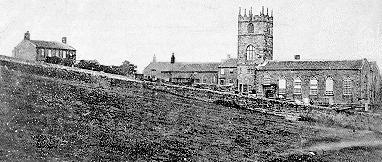Bombay Kalbadevie Road 1890
TO MISS ELLEN NUSSEY
‘April 5th, 1851.
‘Dear Ellen,—Mr. Taylor has been and is gone; things are just as they were. I only know in addition to the slight information I possessed before, that this Indian undertaking is necessary to the continued prosperity of the firm of Smith, Elder, & Co., and that he, Taylor, alone was pronounced to possess the power and means to carry it out successfully—that mercantile honour, combined with his own sense of duty, obliged him to accept the post of honour and of danger to which he has been appointed, that he goes with great personal reluctance, and that he contemplates an absence of five years.‘He looked much thinner and older. I saw him very near, and once through my glass; the resemblance to Branwell struck me forcibly—it is marked. He is not ugly, but very peculiar; the lines in his face show an inflexibility, and, I must add, a hardness of character which do not attract. As he stood near me, as he looked at me in his keen way, it was all I could do to stand my ground tranquilly and steadily, and not to recoil as before. It is no use saying anything if I am not candid. I avow then, that on this occasion, predisposed as I was to regard him very favourably, his manners and his personal presence scarcely pleased me more than at the first interview. He gave me a book at parting, requesting in his brief way that I would keep it for his sake, and adding hastily, “I shall hope to hear from you in India—your letters have been and will be a greater refreshment than you can think or I can tell.”
‘And so he is gone; and stern and abrupt little man as he is—too often jarring as are his manners—his absence and the exclusion of his idea from my mind leave me certainly with less support and in deeper solitude than before.
‘You see, dear Nell, though we are still precisely on the same level—you are not isolated. I feel that there is a certain mystery about this transaction yet, and whether it will ever be cleared up to me I do not know; however, my plain duty is to wean my mind from the subject, and if possible to avoid pondering over it. In his conversation he seemed studiously to avoid reference to Mr. Smith individually, speaking always of the “house”—the “firm.” He seemed throughout quite as excited and nervous as when I first saw him. I feel that in his way he has a regard for me—a regard which I cannot bring myself entirely to reciprocate in kind, and yet its withdrawal leaves a painful blank.’
TO MISS ELLEN NUSSEY
‘April 9th, 1851
‘Certainly I shall not soon forget last Friday, and never, I think, the evening and night succeeding that morning and afternoon. Evils seldom come singly.
 And soon after Mr. Taylor was gone, papa, who had been better, grew much worse. He went to bed early, and was very sick and ill for an hour; and when at last he began to doze, and I left him, I came down to the dining-room with a sense of weight, fear, and desolation hard to express and harder to endure. A wish that you were with me did cross my mind, but I repulsed it as a most selfish wish; indeed, it was only short-lived: my natural tendency in moments of this sort is to get through the struggle alone—to think that one is burdening and racking others makes all worse.
And soon after Mr. Taylor was gone, papa, who had been better, grew much worse. He went to bed early, and was very sick and ill for an hour; and when at last he began to doze, and I left him, I came down to the dining-room with a sense of weight, fear, and desolation hard to express and harder to endure. A wish that you were with me did cross my mind, but I repulsed it as a most selfish wish; indeed, it was only short-lived: my natural tendency in moments of this sort is to get through the struggle alone—to think that one is burdening and racking others makes all worse.‘You speak to me in soft consolating accents, but I hold far sterner language to myself, dear Nell.
‘An absence of five years—a dividing expanse of three oceans—the wide difference between a man’s active career and a woman’s passive existence—these things are almost equivalent to an eternal separation. But there is another thing which forms a barrier more difficult to pass than any of these. Would Mr. Taylor and I ever suit? Could I ever feel for him enough love to accept him as a husband? Friendship—gratitude—esteem I have, but each moment he came near me, and that I could see his eyes fastened on me, my veins ran ice. Now that he is away I feel far more gently towards him; it is only close by that I grow rigid—stiffening with a strange mixture of apprehension and anger, which nothing softens but his retreat and a perfect subduing of his manner. I did not want to be proud, nor intend to be proud, but I was forced to be so.
‘Most true is it that we are over-ruled by one above us—that in his hands our very will is as clay in the hands of the potter.
‘Papa continues very far from well, though yesterday, and I hope this morning, he is a little better. How is your mother? Give my love to her and your sister. How are you? Have you suffered from tic since you returned home? Did they think you improved in looks?
‘Write again soon.—Yours faithfully,
‘C. Brontë.’
nytimes/marshall-east-------------------
Extracts from George Smith's - The Recollections of a
long and busy life, c1895
The business of Smith, Elder & Co was now prospering and a new partner named
Patrick Stewart had been taken into the firm. Stewart was the son of an
Edinburgh divine of some fame and a ward of Mr Aeneas Mackintosh, at that time
the head of the great firm of Mackintosh & Co, of Calcutta. He was a young
man of social tastes and, in some respects, of brilliant gifts. His guardian
arranged that Stewart should join my father’s firm, and advanced the necessary
capital, which was to be repaid by the firm out of Stewart’s share of the
profits. nineteenth_century_literary_manuscriptsThe British Empire in India
The 1850s witnessed the introduction of the three "engines of social improvement" that heightened the British illusion of permanence in India. They were the railroads, the telegraph, and the uniform postal service, inaugurated during the tenure of Dalhousie as governor-general. The first railroad lines were built in 1850 from Howrah (Haora, across the Hughli River from Calcutta) inland to the coalfields at Raniganj, Bihar, a distance of 240 kilometers. In 1851 the first electric telegraph line was laid in Bengal and soon linked Agra, Bombay, Calcutta, Lahore, Varanasi, and other cities. The three different presidency or regional postal systems merged in 1854 to facilitate uniform methods of communication at an all-India level. With uniform postal rates for letters and newspapers--one-half anna and one anna, respectively (sixteen annas equalled one rupee)--communication between the rural and the metropolitan areas became easier and faster. The increased ease of communication and the opening of highways and waterways accelerated the movement of troops, the transportation of raw materials and goods to and from the interior, and the exchange of commercial information.




but each moment he came near me, and that I could see his eyes fastened on me, my veins ran ice.
BeantwoordenVerwijderenMr. Taylor's suit was hopeless in that case. Warmth was something CB had to have. In her books chilled veins is not a good sign lol . In Mr. Taylor's case, it was an instinct she could not disobey or discount even in the mist of with her dreadful loneliness.
I feel that there is a certain mystery about this transaction yet, and whether it will ever be cleared up to me I do not know; however, my plain duty is to wean my mind from the subject, and if possible to avoid pondering over it.
This is very similar language Charlotte used about the situation with Arthur Bell Nicholls at an early point. Others thoughts and feelings and even her own could be at times mystery to Charlotte. Odd in someone so perceptive usually . Sometimes she had to learn things the hard way ....though trial and error.
Mr. Nicholls could put her "pass her patience" with his narrow views...but Charlotte never mocked his physical appearances as she did with so many others. What a difference with the ink she spent on James Taylor's short comings in that regard! She cannot speak of him without pointing them out! lol